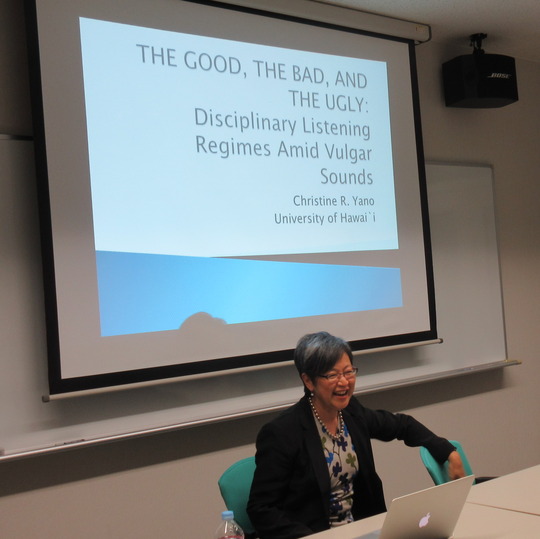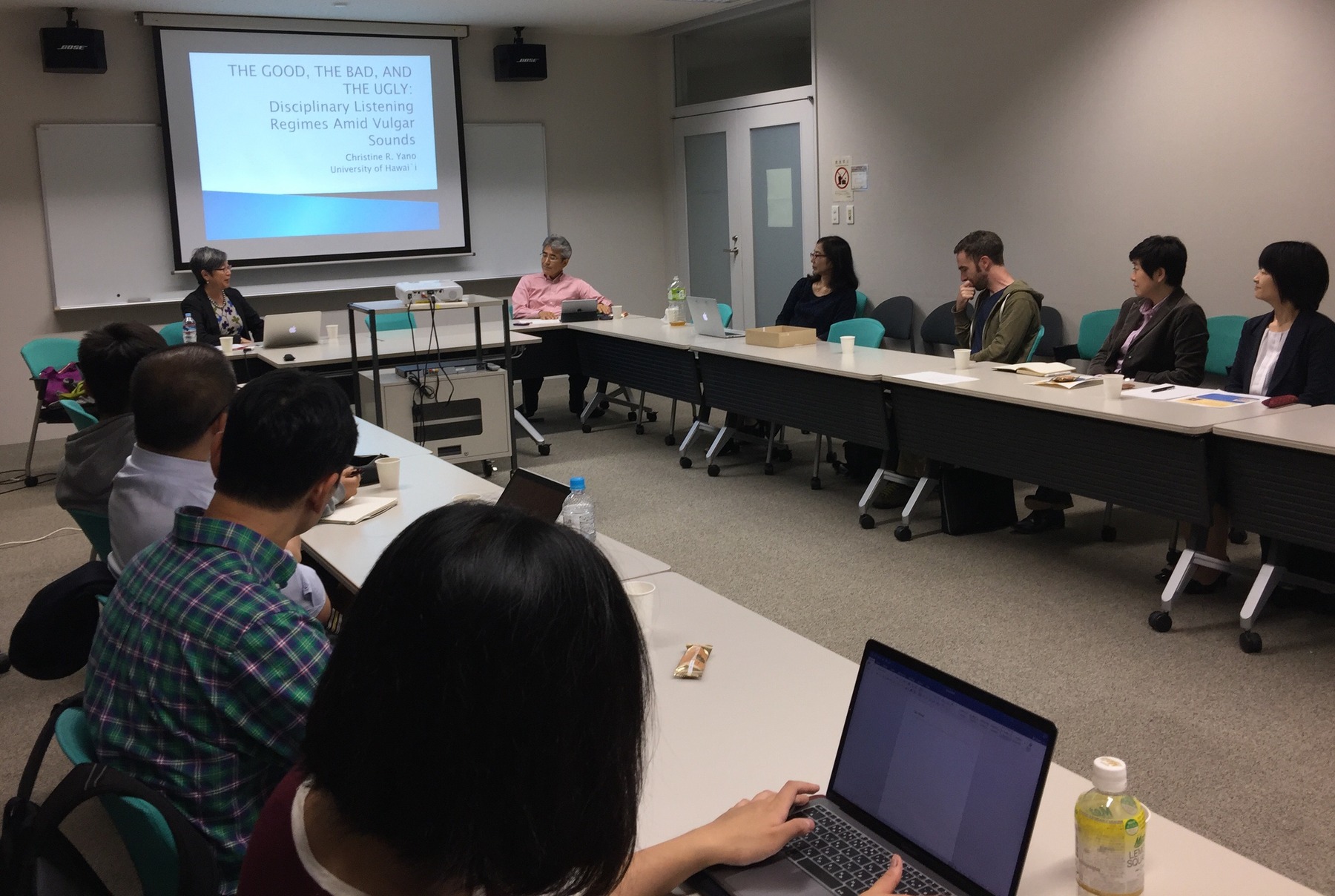
Project 5 “Critiquing Diversity” lecture series 2017: “The Good, the Bad, and the Ugly: Disciplinary Listening Regimes amid Vulgar Sounds” Jiaxi HOU
- Time and Date:
- 6:00 - 7:30PM, Thursday, October 5, 2017
- Venue:
- Collaboration Room 3, 4th Floor, Building 18, Komaba Campus, The University of Tokyo
- Speaker:
- Christine YANO (Professor of Anthropology, University of Hawai`i at Manoa)
- Organized by:
- Educational Project 5 “Cultural Diversity and Imagination,” Integrated Human Sciences Program for Cultural Diversity, The University of Tokyo
Held by Project 5, the lecture “The Good, the Bad, and the Ugly: Disciplinary Listening Regimes amid Vulgar Sounds” introduced Professor Yano’s ongoing project on exploring the practices and implications of English education in Hawaii from 1924 to 1960. An anthropologist at the University of Hawaii, Professor Yano is also the author of the popular book Pink Globalization: Hello Kitty’s Trek Across the Pacific, which discusses how Hello Kitty was constructed as the icon of Japanese popular culture and its subsequent international popularity. I have read chapters of the book before and found it provides a clever perspective and a systematic method with which to analyze the current flow of popular culture, which radiated from an image icon. It inspired my own research, which shares a focus on the flow of popular culture in the era of globalization. Thus, I attended the lecture not only to learn of Professor Yano’s updated research project but also to seek new inspirations for my own study.
The theme of the lecture was a unique English Standard School System in the pre-statehood period of Hawaii, which was an education system that restricted enrollment on the basis of an oral English examination. Professor Yano introduced her new ethnographic findings from exploring the system, including abundant interviews from the students of that time and archival studies. She found out that the system utilized language as a way to carry out de facto racial segregation and to achieve “pure” Americanization. Within this process of selecting students through oral English tests, the aurality of language played a primary role as the gatekeeper, rather than other factors such as race or class. The impact of the system goes way beyond these classrooms, as it defines and divides new standards in English listening, from what is considered good English to the bad or even the ugly. These divisions further influence people’s understandings and identities of their intelligence, social status, race, and the authenticity of the American citizenship. Especially among the local Pidgins, who use English as their first language (but their oral English is regarded as non-standard, bad, or even vulgar), their identities and sense of achievements are largely impacted by the emphasis on standard oral English.
Although Professor Yano’s new research no longer deals with the spread of popular culture, I still found the lecture inspiring and helpful. My concerns toward the lecture consist of the four following aspects: the importance in acknowledging listening as a core cultural factor, the method with which to decode listening practices, the generalization of an ethnographic work, and the construction of cultural identities. First, as many other attendees of the lecture also acknowledged, it is very inspiring to choose listening as the entry point to bring about a renewed understanding of the construction and changes of various identities, ranging from citizenship, to race, or even social class. Although this project deals with a historical period, the emphasis on listening is especially important in the current multi-media environment. In my field of Internet research, I have found abundant studies make use of textual or visual material. However, aurality has gained increasing importance in the circulation of popular culture with the help of new media techniques, which few researchers have paid enough attention to. Cultural phenomena such as the crowd-creating of Hatsune Miku or online video game streamers evidence the listening aspect of the current online popular culture. Furthermore, Professor Yano provides her method to decode these listening practices and experiences through interviewing and archive studying. As analyzing listening material faces more difficulty than textual material for its temporality, her method serves as a justified way to conduct further analysis.
Third, it is motivating for me to discover that the ethnographic work conducted in Hawaii can be generalized, to some extent, to understand situations in a detached circumstance. The processes of listening language being utilized as the gatekeeper of citizenship and other identities, such as intelligence and social status, can also be found in the historical period after the 1940s between China and Taiwan. The cultural and historical backgrounds are incommensurable; we hardly expect ethnographic research can be generalized worldwide, but a similar process of the power of language exists. Nonetheless, one study can still be foundational in understanding other phenomena, even though the circumstances are entirely different.
Fourth, the lecture encourages me to rethink the factors that contribute to multiculturalism, which comes from the co-existence of diverse ethnicities. However, as Professor Yano indicates in her study, other factors, such as language, serve as the de facto segregation tool in a more implicit way and leave behind complicated legacies to the current world. Moreover, nowadays, cultural identities are not constructed merely according to ethnicity, social status, gender, or nation. Related to my own study, Internet technique reorganizes community and helps construct identity according to interests rather than space or appearance and crosses traditional borders. Considering multiculturalism in the contemporary circumstances, I may rethink the importance of other factors such as technology and the updated concept of community with new media techniques.
Finally, Professor Yano’s lecture provided us a wonderful chance not only to learn from her ongoing research project but also inspired us in rethinking my own studies. I am very appreciative to Professor Yano, Professor Yaguchi, Professor Ellis, and the IHS Project 5 for organizing such a great lecture.

報告日:October 22, 2017


